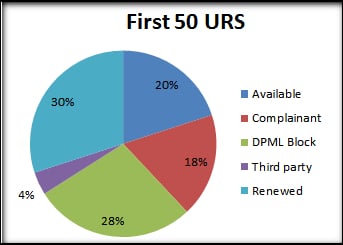Adding URS to .com could benefit Verisign for several reasons. This week, Verisign (NASDAQ: VRSN) proposed creating a consensus policy that would bring Uniform Rapid Suspension (URS) to all remaining gTLDs that don't have it. It was somewhat ... Continue Reading3 Comments
Verisign proposes adding Uniform Rapid Suspension to .com domain names
· Policy & LawProposal surprises working group members. Verisign (NASDAQ: VRSN) has proposed making Uniform Rapid Suspension (URS) a consensus policy that would apply to legacy top level domains such as .com and .net. Uniform Rapid Suspension is a quicker, ... Continue Reading14 Comments
URS Panelist: “Complainant’s business may be worldwide but it is not out of this world”
· Policy & LawUniform Rapid Suspension is designed for cases with an overwhelming evidence of bad faith. This post is part of a series on UDRP issues by the Internet Commerce Association. Uniform Rapid Suspension (URS) is a relatively new mechanism for trademark ... Continue ReadingLeave a Comment
A strange thing is happening to domain names suspended in URS
· Policy & Law...they're being renewed. Uniform Rapid Suspension (URS) was introduced as an alternative to Uniform Domain-Name Dispute-Resolution Policy (URDP) when new top level domain names were introduced. URS is a faster, cheaper version of UDRP. A big ... Continue Reading4 Comments
Lawsuit filed over .email domain names
· Policy & LawYoyo.email files lawsuit after barrage of URS and UDRP complaints. Last month I wrote about Yoyo.email Ltd, a company that has found itself in legal hot water after registering over 4,000 .email domain names. Many of the domain names match well ... Continue Reading126 Comments
Registrant of 4,000+ .email domain names faces mounting legal problems
· Policy & LawYoyo.email claims it registered trademark-matching .email domain names for a legitimate fair use. Most National Arbitration Forum panels have disagreed. You've probably never heard of Yoyo.email before, but it is one of the biggest individual ... Continue Reading9 Comments
Porsche loses Porsche.social URS to planned fan site
· Policy & LawPorsche.social is just a parked page, but its owners claim to be creating a free site for Porsche enthusiasts. Car company Porsche has lost a Uniform Rapid Suspension cybersquatting case it brought against the San Jose, California owner of ... Continue Reading7 Comments
Frank Schilling defends URS against reserved .sexy domain name
· Policy & LawUniform Rapid Sexy. When Frank Schilling released his first handful of new top level domain names he also held back tens of thousands of second level domain names for himself. These were registered in the name of North Sound Names. Since the domains ... Continue Reading2 Comments
Wolfram wins .CEO URS dispute on second try
· Policy & LawThis time the case computes. Search and data company Wolfram has won a Uniform Rapid Suspension (URS) case for Wolfram.ceo...on the second try. It lost the first case because it filed the case as Wolfram Research, Inc. The panelist noted that the ... Continue ReadingLeave a Comment
Wolfram doesn’t use computation in URS dispute
· Policy & LawA lot of brain power missed the connection. Wolfram Research, Inc. has lost a Uniform Rapid Suspension (URS) case for mathematica.guru and wolfram.ceo, and the case is noteworthy for a couple reasons. First, the domain names were owned by two ... Continue Reading1 Comment













